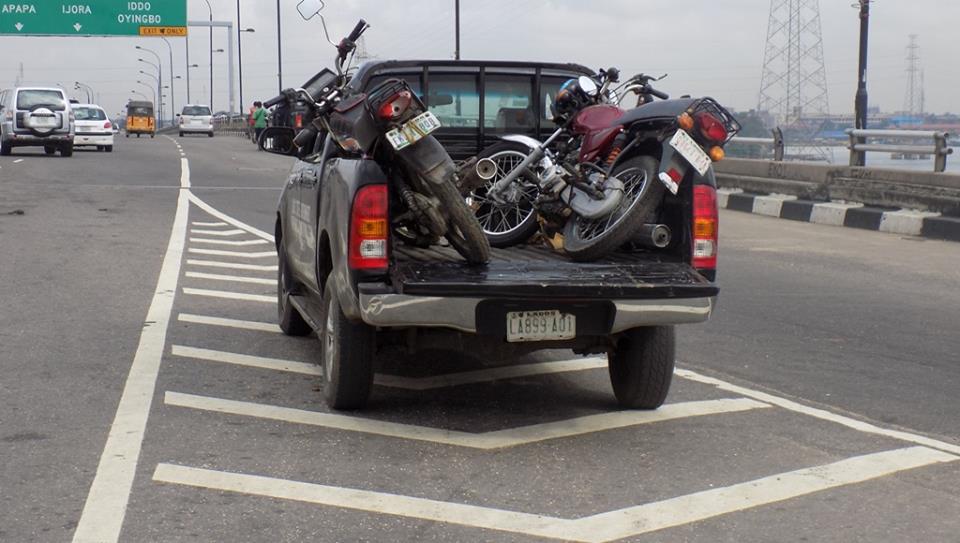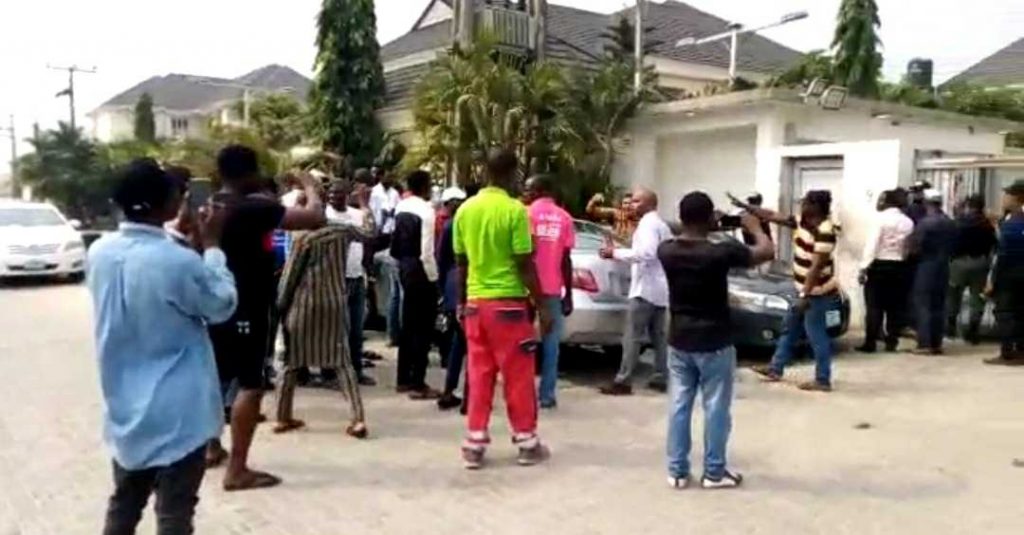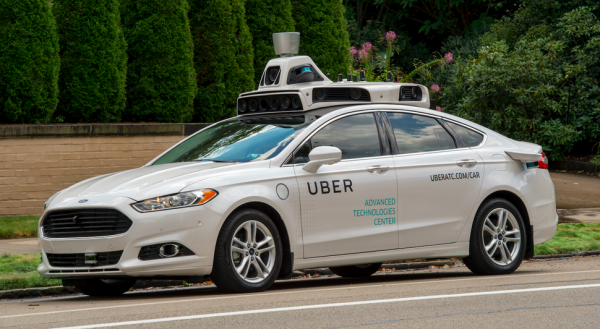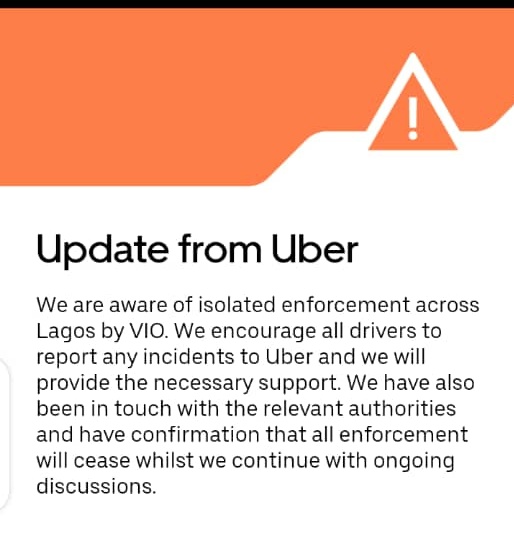It is no longer news that the Lagos state government has phased out motorcycles and tricycles from the metropolis. With the okadas and kekes gone in major areas, the government has turned its focus on taxi-hailing and is currently hot on the heels of Bolt and Uber drivers in the state.
Just last week, agents of the Lagos state Vehicle Inspection Service, assisted by members of the police force went about town, accosting Uber and Bolt drivers and making certain demands of them.


According to reports, the Vehicle Inspection Officers (VIO) were requesting certifications from the Lagos Drivers Institute (LASDRI) from the drivers. According to the law, commercial drivers are required to have that certification if they wish to operate in the state.
The officers were also requesting for Hackney permits and, quite strangely, operating licenses. Licenses are supposed to be obtained by the ride-hailing companies themselves.
According to unconfirmed reports, Uber stopped making Hackney Permits a requirement, a fatal error since hackney permits turn private vehicles to commercial ones.
Licensing ought to be a normal behaviour….
Though initially touted to be a general clampdown on vehicle drivers, the state government would eventually reveal, after an outcry from Uber drivers, that the current clampdown on car-hailing companies is based on the allegation that Uber and Bolt have refused to be licensed to operate in the state.
Thus, they can’t be regulated and most importantly, they can’t be duly taxed. Clearly put, since ride-hailing companies launched their services, they have allegedly avoided the state’s agents of licensing, regulation and taxing.
The state government wants to change that.
Should the government get Uber, for instance, to comply by going after the independent drivers or by going after Uber itself?
It’s a very tricky situation.


After all, it is a question of who to regulate…
The surest way to get cab-hailing companies to comply is by stifling their operations. However, wouldn’t it be smarter perhaps lawful if the government prohibits activities of the ride-hailing companies through a court declaration pending when they agree to be licensed instead of hounding citizens who, technically, don’t work for Uber?
Because, in the end, the vehicles that are impounded don’t belong to Uber. They are all exclusively the properties of the drivers. The general operation and logistics are borne by the drivers. All Uber owns is the technology for which they charge between 20%-30% per trip.
On second thought, Bolt and Uber’s technology, just like many others, is an abstract entity. So even if the state government were to get a court ruling prohibiting them, there will be no way of monitoring or implementing it except by tracking drivers who onboard onto that technology.
The next workable solution would be a route the state government should have taken a long time ago; Regulating tech with tech.
The Cab-Hailing Companies are not all Clean
Neither Uber nor Bolt has denied the allegations made by the state government. And if the words of the Chairman of the ride-hailing drivers body, Comrade Ayoade Ibrahim is anything to go by, then even the drivers are aware that their partner companies are falling short.
Ibrahim, however, claims his union has a solution.
“We know that this thing will happen that’s why we approached the state government last year,” he said. “The first letter we wrote to the Lagos state government is on the 28/6/2018 to explain to them what they supposed to do to Uber, to Bolt, so that the government can get their revenue from them with ease.”
Ibrahim claims his union eventually wrote 4 more letters, 3 of them in 2019 but they all yielded little result.
If this is exactly the case, then it is quite unfortunate that the ride-hailing drivers, who have mostly kept their ends of the bargain, both on the government’s side and the companies’ side, have to pay for the shortcomings of both government and the companies.
Government denies wrongdoing
The Lagos state government has since denied targeting Uber and Bolt drivers insisting that its operatives only carried out routine checks. The government claimed that the Uber drivers arrested, about 20 of them, were driving without drivers licences.
Uber operators are out to make mischief as they would not tell the public that their members whose vehicles were apprehended contravened one law or the other. No operator has a right to drive around without a driver’s licence.
– Lagos state government
The statement by the Lagos state government largely contradicts a comment made by a VIS officer who insisted Uber and Bolt weren’t licensed to operate in the state. It also contradicts the statement made by ride-hailing drivers that they were specifically been hounded for not having operating licences. Some even claim to have been asked to pay N11,000 for the licence.
Suffice it to state that not many people believed the government.
With this denial though, one thing has been established: it is not the duty of Bolt and Uber drivers to obtain licences. It is clearly the duty of the ride-hailing companies. And it is the duty of the government to make them comply. So why is the grass made to suffer under the weight of two elephants locked in combat?
A Dive into the Uber Angle…
Asides the admission by the chairman of the ride-hailers that the companies have a countless list of defaults, a more worrying twist to the story was put forward by a former super-contractor on the Uber platform named Pastor Gbenro.
Gbenro who controls a fleet of vehicles on the Uber platform alleges that the company has been the main propagator of its own misfortunes.


According to him, several checks and measures put in place by Uber to ensure optimum operation in Lagos has been ditched because, well, who really cares?
There used to be a skills test, to confirm the drivers could use electronic devices and navigate maps. There used to be a psychometric test to ensure drivers weren’t moving mad with criminal tendencies. There used to be a city test to ensure you recognized a few landmarks in the city. All removed.
Pastor Gbenro
“The driver’s license was the accepted document for driving, Uber started accepting Learners permits. We used to have weekly promos encouraging people to drive and drive well. Every week there was a list of best drivers in the city based on their ratings. All that was removed,” Pastor Gbenro claimed.
He went on to explain that the reason Uber drivers are being brutalised at the airport and made to pay N20,000 is that the company failed to meet and negotiate with the Federal Airport Agency of Nigeria (FAAN).
If Gbenro’s assertions are anything to go by, one won’t be wrong to conclude that bike-hailing companies are trying its very best to avoid authorities it is supposed to work with to ensure smooth operations. Sadly, its drivers are paying the price for it.


Uber’s downward trend could be attributed to its attempt to compete with “Taxify” which was renown for having more drivers on its platform because of lesser regulations.
On a Final Note…
It is a typical Nigerian situation, isn’t it?
A situation where the most vulnerable are taught bitter lessons just to get to another not-so-vulnerable entity. It is understood that VIO personnel have now adopted the strategy of placing orders for rides then arresting the drivers as part of its clampdown.
This could have either of two outcomes: (1) bring Uber and Bolt to the negotiation table which clearly hasn’t been possible, or (2) make the drivers develop innovative ways of beating this regime, which is highly probable. The drivers would always find a way to earn a living.
It is an irony that both the Lagos State Government, Bolt / Uber and their drivers are all pursuing their individual interests at the expense of the ordinary Lagosians that ought to serve.






